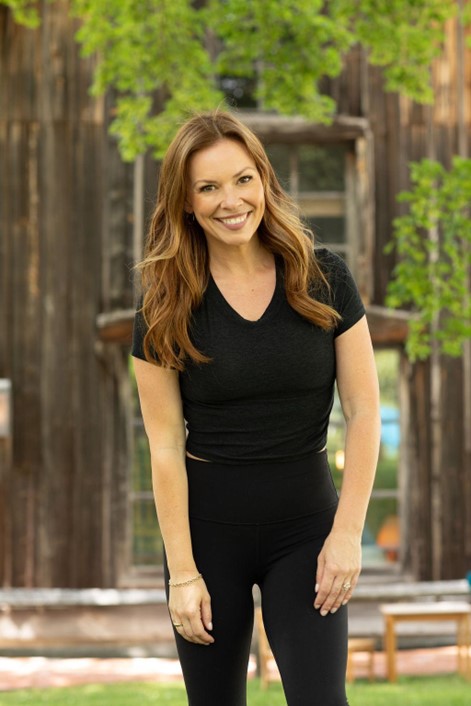Sarah: “The bad days don’t last forever.” (Hashimoto’s disease and Hypothyroidism)
Published 22 Nov 2023 • By Somya Pokharna
Sarah, a seasoned personal trainer and nutritionist, found her vibrant life altered by unexpected adversaries—Hashimoto's disease and Hypothyroidism. Her journey unveils the challenges of navigating this autoimmune condition that disrupted her energetic lifestyle.
In this inspiring interview, Sarah delves into the profound impact of her conditions on her physical and emotional well-being. From unexplained symptoms to a maze of inconclusive diagnoses, Sarah's resilience and commitment to holistic wellness reshaped her priorities, empowering her to become 'The Thyroid Trainer' and support others navigating similar challenges.
Read on to discover how she navigates the intricate landscape of thyroid issues with resilience and self-advocacy.

Sarah! Thank you so much for agreeing to share your story with the Carenity audience.
First of all, could you tell us more about yourself?
I have been a certified personal trainer and nutritionist for the past 13 years and was diagnosed with Hashimoto’s almost 10 years ago. I live in Pound Ridge, NY with my husband, toddler and 2 sweet rescue cats.
I graduated from The University of Virginia with a degree in Economics and after a year or so of working in the corporate world, I realized my passion was working closely with people and I made the transition to personal training. I was always extremely active growing up. I danced, played sports and even started weightlifting in high school, so it was a natural fit!
Could you describe your condition, Hashimoto’s disease? When and how did you first notice the symptoms, and what prompted you to seek a diagnosis?
Hashimoto’s is an autoimmune disease, where the body’s immune system mistakenly attacks the thyroid gland, leading to inflammation and damage to the thyroid tissue. Over time, this damage can cause the thyroid gland to become underactive, resulting in a condition called hypothyroidism. Hypothyroidism occurs when the thyroid gland doesn't produce enough thyroid hormones, which can lead to a variety of symptoms, such as fatigue, weight gain, sensitivity to cold, dry skin, and constipation.
I first started noticing symptoms in the summer of 2013. I was gaining weight out of nowhere - one day I gained six pounds total! I was extremely tired, depressed, my hair was falling out and I did not feel like myself at all.
I knew my mom and maternal grandma had thyroid issues, so it was in the back of my mind. But when I went to the first doctor, they ran my labs and said all my levels were in range and then sent me on my way.
I went to two more doctors who continued to say I was fine, when in reality, I felt anything but fine.
I finally found an amazing homeopathic doctor who diagnosed me and was able to treat me.
How has your condition affected your daily life and routine? What kind of physical and emotional challenges has living with this condition presented for you? Can you share any specific triggers or factors that worsen your symptoms?
I am definitely more conscious of my sleep and stress levels.
I don’t have the physical stamina I used to have before my diagnosis, so instead of working out for hours a day, I keep it quick and simple opting for walks and strength workouts under 30 minutes.
My specific triggers are gluten, lack of sleep, major stressors like moving, hormones and gut health. I was feeling off for a while recently and wasn’t able to fully heal until I had bloodwork done and discovered I had a parasite. My doctor gave me an anti-fungal and after a couple weeks I was feeling good again.
What is your current treatment to cope with the fluctuating nature of Hashimoto’s disease symptoms and your thyroid function? Are you satisfied with it?
I currently work with my amazing functional medicine doctor who has healed me multiple times and also with an endocrinologist who will monitor my thyroid levels and prescribes me my medication. Because of my expertise in this disease, I’m pretty satisfied with my level of care and I also know how to advocate for myself and health. When I start feeling symptoms again, I take a step back and evaluate my health habits and what I can do to support my body.
Has your perspective on life and your priorities changed since being diagnosed, and how do you stay positive and maintain your emotional well-being while living with this condition?
I am definitely more conscious of stress on my body. I don’t feel bad cancelling plans or saying no to events and my mental health is a top priority. When I was younger, I never took any breaks and ran around working 12 hours a day, drinking coffee on an empty stomach, not eating enough and not getting enough sleep. I can’t do that anymore!
I stay positive by writing in a gratitude journal and keeping things in perspective. I may have some health challenges, but I have a lot to be grateful for as well. I do a lot of meditation, breathwork and yoga to calm my mind and working out also helps to boost my mood as well.
What are some misconceptions or common misunderstandings that you've encountered regarding Hashimoto’s disease, and how would you like to address them?
The biggest one would be that nutrition has no effect on the disease. This couldn’t be further from the truth, and as a certified nutritionist I love sharing my favorite recipes and meal plans. What we eat has a profound effect on our energy, mood, and ability to lose weight. It’s also one of the fastest ways to see a difference in your symptoms. I always recommend people cut out gluten, dairy and sugar for 2 weeks to see how they feel.
What inspired you to become The Thyroid Trainer? Was there a specific moment or realization that prompted this decision?
After struggling with Hashimoto’s and then finally living symptom free and feeling like myself again, I realized that my story could become someone else’s survival guide. There’s a lot of conflicting information, unhelpful doctors and overwhelm, and I wanted to help other women who were struggling.
I really love creating my workout videos and hearing that my programs and advice have helped so many people. When my clients tell me that they feel better, have more energy and are losing weight, I am filled with joy and so lucky that this is my job.
How has the support of friends and family been crucial in your journey with Hashimoto’s disease, and do you have any advice for others on how to best support loved ones dealing with similar challenges?
Support is crucial because a lot of times friends and family don’t understand what we are going through. I need support when I haven’t slept well or just need a mental break. And also making sure there are gluten-free foods when dining is a big help as well!
The best ways you can support loved ones dealing with similar challenges is to learn a little about the disease, let them know you are there for them and find ways to make their lives a little less stressful. I had a client recently whose husband bought her my online weight loss program and after only 3 weeks, she said she was already feeling so much better. I thought that was so sweet he supported her like that.
What are your hopes and aspirations for the future, both in terms of your personal life and the Hashimoto’s disease community as a whole?
My hope for the Hashimoto’s community is that we can be better treated by doctors and supported with more than just medication. Some of the thyroid medications prescribed contain a lot of fillers that are harmful to our health, so it would also be amazing to have cleaner meds.
Personally, I just want to reach as many people as possible and share my story and methods so that more women and men can get off the Hashimoto’s roller coaster. I’ve been growing my little YouTube channel with Hashimoto’s friendly workouts and would love to one day turn that into an app.
Do you have any final words of advice you'd like to share with others with Hashimoto’s disease who are facing similar challenges?
You are not alone, and the bad days don’t last forever. This disease isn’t your fault and remember to take it one day at a time.
Also, if you’re on medication or your labs are normal, and you still don’t feel good, keep digging. There are so many root causes, and it’s a very complex disease, so we have to be our own health advocates. If you need help, don’t hesitate to reach out!

A big thank you to Sarah for this interview!
Do not forget to check out her website, The Thyroid Trainer, and her YouTube channel.
Did you find this story helpful?
Click Like and share your thoughts and questions with the community in the comments below!
Take care of yourself!
Comments
You will also like

Anemia, Hashimoto disease, aortic insufficiency, type 1 diabetes...just to name a few. This is my story of misdiagnosis
22 Jul 2019 • 1 comment

Stop industrial foods to fight obesity, diabetes, Lyme disease and depression
8 Feb 2019 • 1 comment

 Facebook
Facebook Twitter
Twitter
